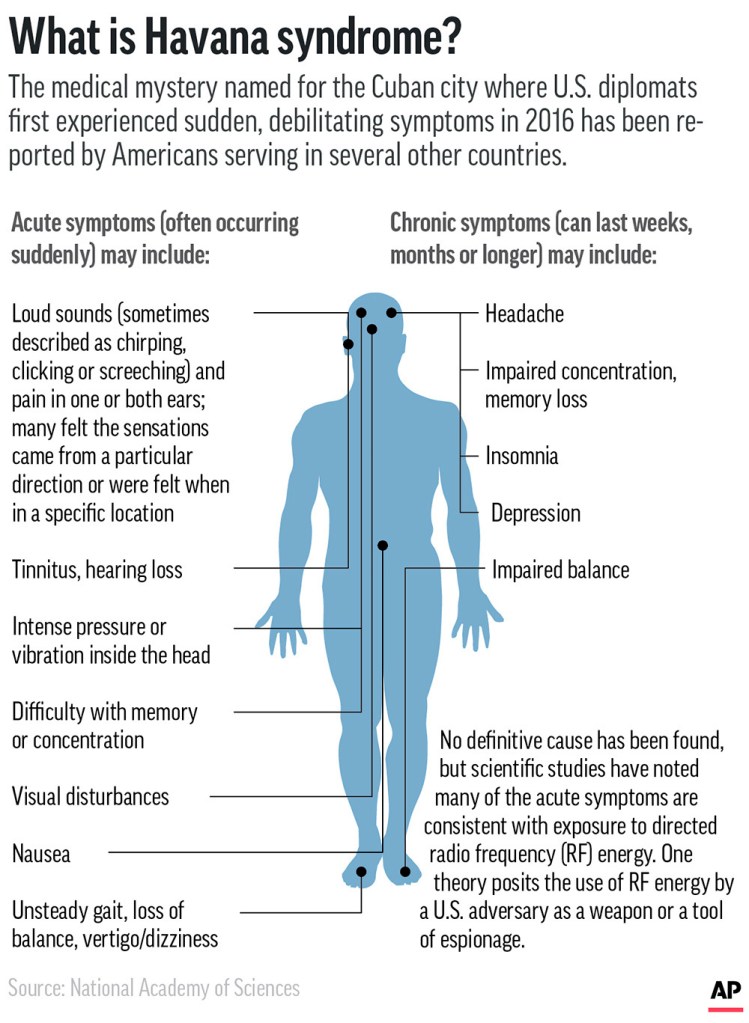A shadowy Russian hit squad may be behind the mysterious “Havana Syndrome” that has left more than 100 US diplomats, White House staffers, intelligence agents and their families with unexplained brain injury symptoms, a bombshell new report claims.
Members of Russian military intelligence unit 29155, who allegedly have access to microwave or ultrasound weapons, had been placed at the scene of reported attacks that resulted in US personnel suffering health problems, according to a year-long investigation by the Latvia-based Insider in collaboration with CBS’s “60 Minutes” and Germany’s Der Spiegel.
Furthermore, the Russian spies may have attacked Americans in the US — not just overseas, the report says.
Christo Grozev, the head of investigations with The Insider, told “60 Minutes” that he uncovered accounting records that show a 29155 officer received a bonus for work related to the development of “non-lethal acoustic weapons.”
“It’s the closest to a receipt you can have for this,” the veteran journalist said.

AP
The Havana Syndrome, so named because it was first reported in 2016 by US embassy worker in the Cuban capital, remains mysterious. Those afflicted report a variety of symptoms, including headaches, dizziness, nausea and other side effects consistent with traumatic brain injuries.
The report comes despite a US intelligence investigation last year that found that it was “very unlikely” a foreign adversary was responsible for the symptoms.
The Insider’s investigation allegedly uncovered evidence of Unit 29155’s presence in Tbilisi, Georgia, in the fall of 2021, when multiple American officials and their family members reported suffering unexplained health issues.
The wife of a Justice Department staffer working in Tbilisi told “60 Minutes” she was in her laundry room when she was overwhelmed by a sound that she believed came from the window.
The woman, who asked not to be named, came down with a devastating headache and projectile vomited.
When she later looked at the security footage, she said she spotted an unfamiliar car outside. Nearby was a man she did not know.
A day earlier, a call was intercepted in Tbilisi, on which a man’s voice could be heard asking in Russian: “Is it supposed to have blinking green lights?” and “Should I leave it on all night?,” according to “60 Minutes.”
While the caller has not been identified, sources have told the CBS program that the investigation had zeroed in on Russian national Albert Averyanov, who is said to be the son of Unit 29155’s commander — and whose name appeared on travel manifests and call logs alongside known members of the secretive intelligence squad.
When the wife of the DOJ official sickened by the piercing sound in Tbilisi was shown a photo of Averyanov, she said it “absolutely” looked like the man she saw outside her home that day in October 2021.
“And when I received this photo, I had a visceral reaction,” she said. “It made me feel sick.
There is further evidence that Russian operatives may have targeted Americans — not only in foreign postings, but also on US soil.
An FBI agent working in counterintelligence, who gave her name only as “Carrie,” told “60 Minutes” that she was home in Florida in 2021 when her right ear was pierced by a sensation she compared to “a dentist drilling — on steroids.”
At the same time, she said the battery in her phone began to swell to point of breaking the case.
The FBI agent passed out on her couch and later complained of chest pains. For the next several months, she said she experienced problems with her memory and had difficultly with multitasking.
“I was not the same person,” she said.
Although Carrie was not allowed to talk about what she was working on at the time of the incident, other sources speaking to “60 Minutes” said he FBI agent was looking into Vitalii Kovalev, a suspected Russian spy who was caught doing 110 mph near Key West, Fla., in 2020.
A search of Kovalev’s Ford Mustang reportedly turned up a device that could erase the car’s data, including its GPS records, along with a Russian passport.
Kovalev at one time studied radio electronics in a military institute, but after two years he made an abrupt career change and became a chef, working in New York and Washington, according to Grozev, the Insider journalist.
“Once you’re in the military, and you’ve been trained, and the [Russian] Ministry of Defense has invested in you, you remain at their beck and call for the rest of your life,” Grozev said.
Prior to the attack on Carrie, she had grilled Kovalev for 80 hours as part of the FBI probe, according to sources cited by “60 Minutes.”
In the end, Kovalev was sentenced to 30 months in jail, and returned to Russia after being released in 2022.
Grozev has unearthed a death certificate indicating that Kovalev was killed last year fighting in Ukraine.
“One theory is that he was sent there in order for him to be disposed of,” Grozev said.
The Kremlin on Monday dismissed the bombshell tying the Havana syndrome to Russian military intelligence.
“This is not a new topic at all; for many years the topic of the so-called ‘Havana Syndrome’ has been exaggerated in the press, and from the very beginning it was linked to accusations against the Russian side,” Kremlin spokesman Dmitry Peskov said.
“But no one has ever published or expressed any convincing evidence of these unfounded accusations anywhere,” Peskov said. “Therefore, all this is nothing more than baseless, unfounded accusations by the media.”
Congress passed the Havana Act in 2021 authorizing the State Department, CIA and other government agencies to provide payments to staff and their families affected by the ailment during assignment.














